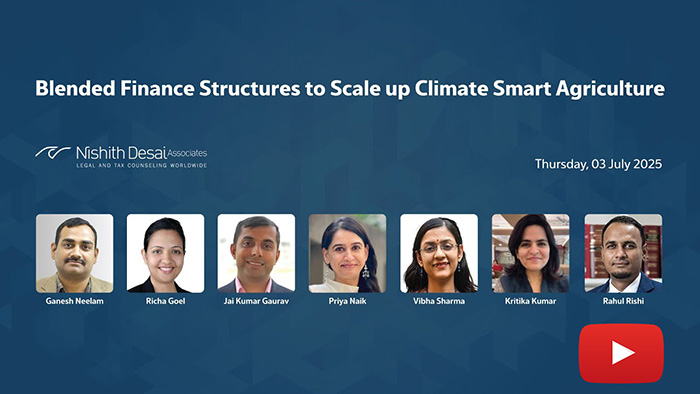|
Key Takeaways from webinar on ‘Blended Finance Structures to Scale Up Climate Smart Agriculture’

Co-hosted by: Villgro, IKEA Foundation, Sustain+, Samhita CGF, GIZ India, Collectives for Integrated Livelihood Initiatives (CInI), and Nishith Desai Associates (NDA).
India’s agricultural sector is rapidly evolving under the pressures of climate change and rural poverty. In this dynamic context, this webinar brought together development sector leaders and legal experts, to explore how Blended Finance (BF) structures can catalyze climate-smart agriculture at scale.
Rahul Rishi, Head of Social Sector & Blended Finance Practice at NDA, opened the session by emphasizing the need to move beyond grants and pilots, advocating for legally sound, scalable BF structures that integrate philanthropic, public, and private capital. Ganesh Neelam, Board member of CInI, shared insights from the Lakhpati Kisan Program, which strengthens tribal livelihoods by integrating climate-resilient technologies. Through renewable energy, drip irrigation, polyhouse nurseries, and farmer-owned institutions like Farmers Producer Organisations (FPOs), the program showed that even smallholder farmers can meaningfully contribute to and benefit from blended finance if appropriately structured. He emphasised the demand on relevant climate smart technologies among small and marginal farmers, which could be an opportunity for financing institutions. Richa Goyal, Programme Manager at IKEA Foundation, explained how interventions like partial subsidies, interest subvention, first loss and guarantee mechanisms can help unlock end-user financing for renewable energy technologies for smallholder farmers. She outlined archetypes of blended finance and emphasized the need for careful targeting to avoid distorting markets. Priya Naik, Founder and CEO of Samhita Social Ventures Private Limited, presented a powerful blended finance continuum involving grants, returnable grants, and credit guarantees. Their returnable grants model (zero interest, zero collateral, flexible repayment) has yielded a 90%+ repayment rate. The approach integrates credit scoring, capacity building, and market linkages, ensuring beneficiaries are eventually mainstreamed into formal financial systems. Jai Kumar Gaurav, Senior Advisor at GIZ India, shared learnings from a credit guarantee facility for waste sector entrepreneurs, now being adapted to agriculture. He emphasized that guarantees must be simple, clearly structured, and timely to instill lender confidence. Lower fees and well-defined trigger events improve accessibility and impact. Kritika Kumar, Energy Advisor at GIZ India, showcased capex subsidy models piloted in Odisha, where donor contributions, vendor discounts, and small bank loans were blended to finance solar aerators and refrigeration units for women fish farmers. These structures improved productivity and livelihoods while encouraging banks to fund first-time borrowers through risk-sharing. Vibha Sharma, Lead of Impact Finance at Villgro Innovations Foundation, spoke on interest subvention models, explaining how reducing borrower interest burdens via philanthropic capital can make credit affordable. She cautioned that while interest subsidies are valuable, they are most effective when paired with derisking instruments like guarantees or subsidies, especially for first-time borrowers. Sehar Sharma, Member of Social Sector Practice at NDA, outlined the legal and regulatory considerations in BF structures, particularly FCRA compliance for foreign contributions, CSR eligibility rules, and donor-type specific restrictions. She stressed the importance of legal structuring aligned with donor obligations and target beneficiary profiles.
The webinar underscored that Blended Finance is not just about capital, it’s about thoughtful design, compliance, and partnerships. The models discussed highlighted how strategic use of legal tools, donor capital, and stakeholder alignment can drive innovation in climate-smart agriculture.
Click here to watch the webinar recording.
Click here to download the presentation deck.
With regards,
Disclaimer
The contents of this hotline should not be construed as legal opinion. View detailed disclaimer.
This hotline does not constitute a legal opinion and may contain information generated using various artificial intelligence (AI) tools or assistants, including but not limited to our in-house tool,
NaiDA. We strive to ensure the highest quality and accuracy of our content and services. Nishith Desai Associates is committed to the responsible use of AI tools, maintaining client confidentiality, and adhering to strict data protection policies to safeguard your information.
This hotline provides general information existing at the time of preparation. The Hotline is intended as a news update and Nishith Desai Associates neither assumes nor accepts any responsibility for any loss arising to any person acting or refraining from acting as a result of any material contained in this Hotline. It is recommended that professional advice be taken based on the specific facts and circumstances. This hotline does not substitute the need to refer to the original pronouncements.
This is not a spam email. You have received this email because you have either requested for it or someone must have suggested your name. Since India has no anti-spamming law, we refer to the US directive, which states that a email cannot be considered spam if it contains the sender's contact information, which this email does. In case this email doesn't concern you, please unsubscribe from mailing list.
|